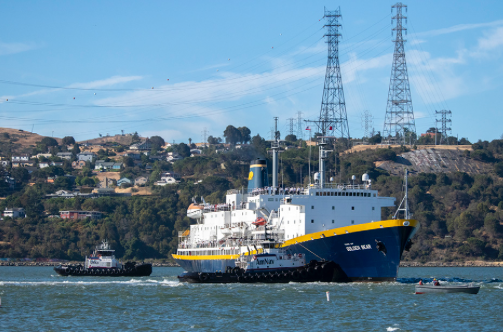President Biden has signed a $1.5 billion spending bill that would assure completion of an ambitious program to replace obsolete training vessels at five state maritime academies with a fleet of highly modern and technically advanced multi-purpose vessels.
The spending package includes funding for the fifth and final National Security Multi-mission Vessel (NSMV) that will go to the California Maritime Academy, replacing the Golden Bear, which has served as the school’s training ship since the mid-1990s.
The first NSMV is now under construction at Philly Shipyard under management of Jacksonville-based TOTE Services and is expected to be delivered to SUNY Maritime in 2023.
The next three vessels are designated for Massachusetts Maritime Academy, Maine Maritime Academy, and Texas A&M Academy.
Cal Maritime expects to receive its ship in the next 3-5 years.
Normally the maritime academies, which are state-run schools that receive federal funding for maritime training, use retired or retrofitted federal vessels to train cadets. But those ships are now 50-plus years old, carry obsolete equipment, and require costly repairs and maintenance.
The new, $320 million NSMV will be larger and taller than the Golden Bear and have many new technology advances, more space for instruction and energy-saving equipment. It will run on diesel-electric, have a diesel generator, can accommodate 600 people (double the size of the Golden Bear), and possess roll-on, roll-off capability, a full training bridge, and a helicopter deck.
The NSMV will provide state schools with a standardized, purpose-built, state-of-the-art platform which will elevate the training and shipboard experience for cadets as they learn the ropes of vessel operations.
“This moment is remarkable,” said Cal Maritime President Tom Cropper. “It culminates eight years of work by the Consortium of State Maritime Academies and for the first time, provides brand new training vessels for our cadets.”
The ship’s multi-mission function means that vessels can be converted to use as a hotel service ship for first responders during natural disasters and humanitarian missions, with space for medical vehicles, or transformed into a communications hub as necessary.
“This investment represents a steadfast commitment to our maritime workforce development and our national security,” Maritime Administration Acting Administrator Lucinda Lessley said in a statement. “The construction and delivery of these vessels also demonstrates a highly innovative and cost-effective shipbuilding program that has enabled the government to draw on industry best practices.”
The nation’s six state maritime schools (which includes Great Lakes Maritime Academy) graduate 70% of all new Coast Guard-licensed maritime officers each year. Most go into the commercial industry, but others support U.S. national security by crewing military sealift vessels.
The spending bill signed by Biden also includes full funding for the Maritime Security Program and a new Tanker Security Program.




